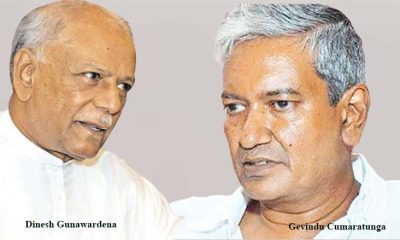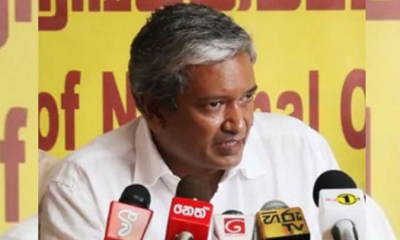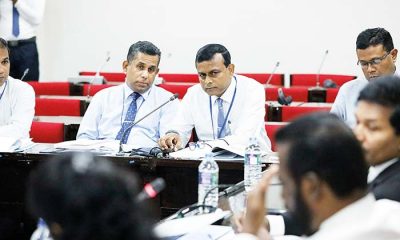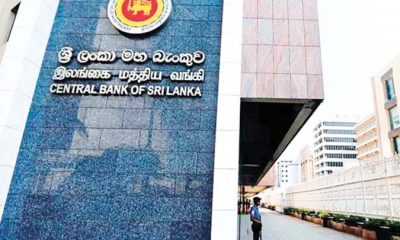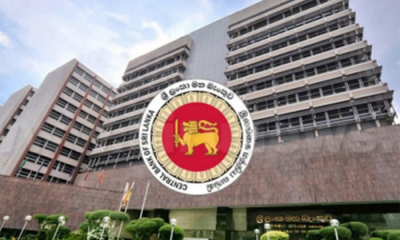News
Harsha says govt. gave haircut to EPF unfairly sparing banks and insurance companies
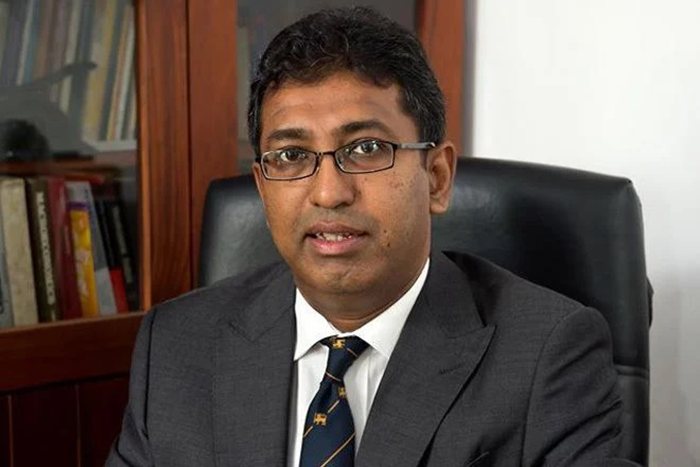
The Committee on Public Finance (COPF) had not received the data that the Central Bank and the Ministry of Finance had when it discussed the resolution on domestic debt restructuring, CoPF Chairman and Samagi Jana Balawegaya (SJB) MP Dr. Harsha de Silva said in a television interview on Wednesday.
“We held discussions with officials of the Central Bank, the Ministry of Finance, and other stakeholders for two days based on the data available to us. They told us that domestic debt restructuring must be done,” he said.
Dr. de Silva said that the Central Bank Governor had said that he wasn’t a great fan of domestic debt restructuring. However, the latter said that the country had to restructure its domestic debt because foreign debt holders were insisting on it, the SJB MP said.
“My stance was that we must avoid restructuring domestic debt. However, if the government insists that this must be done, I have suggested ways in which we could do this in the two blueprints I presented in 2022 and 2023,” Dr. de Silva said.
The SJB MP said that the IMF had not told Sri Lanka that it must restructure its domestic debt. The IMF wanted Sri Lanka’s authorities to restore debt sustainability by reducing the level of public debt below 95 percent of GDP by 2032; reducing the average central government gross financing needs (GFNs) in 2027–32, including from the materialiation of contingent liabilities, below 13 percent of GDP; keeping FX debt service of the central government below 4.5 percent of GDP in any year during 2027-32; and to ensure that the fiscal and external financing gaps are closed.
“Why did we have to restructure domestic debt, then? Reducing the level of public debt below 95 percent of GDP by 2032 is not a difficult thing. Reducing the GFNs is tougher. There are two parts to achieving this. First is the fiscal pillar, i.e., reducing the budget deficit. How do we do this? We have to increase tax revenue, and reduce expenses. The extent of debt restructuring depends on our ability to reduce the budget deficit,” he said.
Dr. de Silva said the government has believed that they can’t reduce the budget deficit beyond this point. Thus, they have asked foreign debt holders for a 30 percent haircut, he said.
“Then these debt owners insist that we also restructure domestic debt, since they have to take a haircut. So about 0.5 percent of the GDP worth of domestic debt had to be restructured,” he said.
The problem is that the burden of the entire debt restructuring has fallen on the EPF, while banks and other such institutions have been made exempt. Out of the total debt portfolio, EPF held 42 percent, while banks held 45 percent, he said. About eight percent was held by insurance companies, MP de Silva said.
“There wouldn’t be any problem if the burden was divided in an equitable manner,” he said.
Sri Lanka had to issue treasury bonds at high interest rates in the last few years because everyone knew that a haircut was inevitable.
“An investor would purchase a bond at 28 percent, expecting that he or she would have to take a cut of about eight percent. However, a large number of those who bought bonds at an interest rate of 28 to 30 percent didn’t have to take a haircut at all. But EPF has to take a big cut and get nine percent interest,” he said.
The SJB MP said those who defend the decision to exempt banks and insurance companies from debt restructuring claim that banks already pay a 50 percent tax on their profit and that the exemption would prevent a collapse in banks. However, both claims are false, he said.
“Funds like the EPF are the last to be affected in all other countries that have restructured domestic debt. Those who contribute to the EPF have no say in how their money is invested. If the burden of domestic debt restructuring was divided equally, both banks, EPF, and insurance companies would have had to pay relatively bearable amounts, and it would not have led to a collapse in the banking sector,” he said.
The SJB had proposed to divide restructuring equally and give banks regulatory forbearance, i.e., a regulatory policy that permits banks and financial institutions to continue operating even when their capital is fully depleted, he said. (RK)
News
US sports envoys to Lanka to champion youth development

The U.S. Embassy in Colombo welcomed the U.S. Sports Envoys to Sri Lanka, former National Basketball Association (NBA) and Women’s National Basketball Association (WNBA) players Stephen Howard and Astou Ndiaye, from June 8 through 14.
The Public Diplomacy section of the U.S. Embassy said that it would launch a weeklong basketball program intended to harness the unifying power of sports, made possible through collaboration with Foundation of Goodness and IImpact Hoop Lab.
While in Sri Lanka, Howard and Ndiaye, both retired professional basketball players, will conduct a weeklong program, Hoops for Hope: Bridging Borders through Basketball. The Sports Envoys will lead basketball clinics and exhibition matches and engage in leadership sessions in Colombo and Southern Province for youth aged 14-18 from Northern, Uva, Eastern and Western Provinces, offering skills and leadership training both on and off the court. The U.S. Envoys will also share their expertise with the Sri Lanka Basketball Federation, national coaches, and players, furthering the development of basketball in the country. Beyond the clinics, they will collaborate with Sri Lankan schoolchildren to take part in a community service project in the Colombo area.
“We are so proud to welcome Stephen and Astou as our Sports Envoys to Sri Lanka, to build on the strong people-to-people connections between the United States and Sri Lanka,” said U.S. Ambassador Julie Chung. “The lessons that will be shared by our Sports Envoys – communication, teamwork, resilience, inclusion, and conflict resolution – are essential for leadership development, community building, equality, and peace. The U.S. Sports Envoy program is a testament to our belief that sports can be a powerful tool in promoting peace and unity.”
News
Rahuman questions sudden cancellation of leave of CEB employees

SJB Colombo District MP Mujibur Rahuman in parliament demanded to know from the government the reasons for CEB suspending the leave of all its employees until further notice from Thursday.
MP Rahuman said that the CEB has got an acting General Manager anew and the latter yesterday morning issued a circular suspending leave of all CEB employees with immediate effect until further notice.
“We demand that Minister Kanchana Wijesekera should explain this to the House. This circular was issued while this debate on the new Electricity Amendment Bill was pending. There are many who oppose this Bill. The Minister must tell parliament the reason for the urge to cancel the leave of CEB employees,” the MP said.However, Speaker Mahinda Yapa Abeywardena prevented Minister Wijesekera responding to the query and said that the matter raised by MP Rahuman was not relevant.
News
CIPM successfully concludes 8th Annual Symposium

The Chartered Institute of Personnel Management (CIPM) successfully concluded the 8th Annual CIPM Symposium, which took place on 31st May 2024. Themed “Nurturing the Human Element—Redefining HRM in a Rapidly Changing World,” the symposium underscored the pivotal role of human resource management (HRM) in today’s dynamic global landscape. Since its inception in 1959, CIPM has been dedicated to advancing the HR profession through education, professional development, and advocacy, solidifying its position as Sri Lanka’s leading professional body for HRM.
Ken Vijayakumar, the President of the CIPM, graced the occasion as the chief guest. The symposium commenced with the welcome address by the Chairperson, Prof. Arosha Adikaram, followed by the Web Launch of the Symposium Proceedings and Abstract Book by the CIPM President. The event featured distinguished addresses, including a speech by Chief Guest Ken Vijayakumar, President of CIPM, and an address by Guest of Honor Shakthi Ranatunga, Chief Operating Officer of MAS Holdings Pvt. Ltd., Sri Lanka.
The symposium also featured an inspiring keynote address by Prof. Mario Fernando, Professor of Management and Director of the Centre for Cross Cultural Management (CCCM) at the University of Wollongong, Australia.
Vote of Thanks of the inauguration session was delivered by Dr. Dillanjani Weeratunga, Symposium Co-chair.
The symposium served as a comprehensive platform for researchers to present their findings across a wide range of critical topics in HRM. These included Cultural Diversity and Inclusion, Talent Development and Retention, Ethical Leadership and Corporate Social Responsibility, Adapting to Technological Advancements, Mental Health and Well-being at Work, Global Workforce Challenges, Employee Empowerment, and Reskilling and Upskilling.
The plenary session was led by Prof. Wasantha Rajapakse. Certificates were awarded to the best paper presenters during the valedictory session, followed by a vote of thanks delivered by Kamani Perera, Manager of Research and Development.
The annual symposium of CIPM was a truly inclusive event, attracting a diverse audience that spanned undergraduates, graduates, working professionals, research scholars and lecturers. This widespread interest highlights the symposium’s significance in the field of HRM, offering a unique opportunity for everyone to network and learn from scholarly brains.The CIPM International Research Symposium was sponsored by Hambantota International Port, Sri Lanka Institute of Information Technology (SLIIT), E B Creasy & Co. PLC, and Print Xcel Company.


